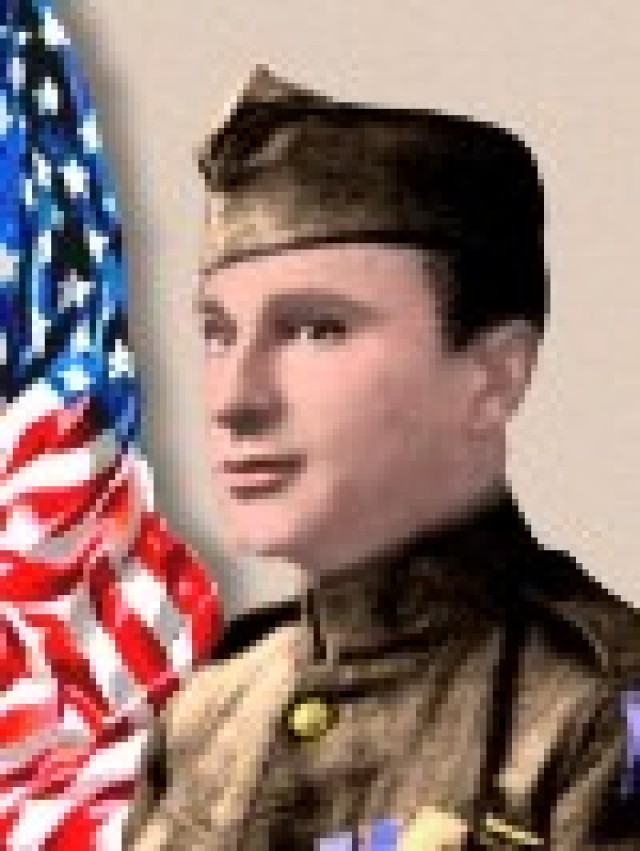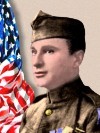(NOTE: This essay is one of a continuing series, authored by Army Sustainment Command noncommissioned officers, marking the Year of the NCO.)
Born on March 10, 1894, Benjamin Kaufman would become one of America's most honored World War I veterans because of his bravery in the Argonne Forest, France, in October 1918. He was an unassuming young man growing up in Brooklyn, N.Y. He never intended to join the Army; he was just a normal college student at Syracuse University when America became a participant in the Great War in 1917.
Early on, Kaufman was assigned to Company K, 308th Infantry, 77th Infantry Division. He was sent to France, where he moved to the front lines immediately. In an epic battle to rescue several of his men, Kaufman was blinded by a gas shell. He refused medical help, but was forced to go to the hospital. However, he stole a uniform and made his way back to his unit, only to find himself faced with bigger trouble than before. Kaufman had to face a court martial for leaving the hospital without proper discharge. He fought the charges placed against him and Army officers eventually cleared him of any wrongdoing and allowed Kaufman to rejoin his fellow soldiers.
First Sergeant Kaufman was already a hero among his peers, and within his unit for acts of bravery. While serving in an advance detail in the Argonne Forest, France, Kaufman and his men were once again facing danger. On Oct. 4, 1918, 1st Sgt. Kaufman and his men came under heavy fire from a German machine gun. Two of his men were immediately wounded. Kaufman confronted the task of silencing the machine gun in order to provide proper assistance to his own men. Unfortunately, before he was able to use his weapons, Kaufman was struck in the arm by enemy fire. With his shattered, bleeding right arm hanging limply by his side, he advanced on the enemy gun alone. He showed no hesitation as he lobbed hand grenades with his left arm. Waving an empty pistol, he charged, managing to take a prisoner while the enemy crew scattered. Kaufman barely made it back to the American lines with his prisoner. He managed to report the position of the German lines before fainting from blood loss. His revelation regarding the enemy's position made it possible for the Americans to move forward and attack. Kaufman received awards for bravery from nine foreign governments, including the Medal of Honor awarded by the United States.
Kaufman continued his service to America after the war. He served as a national commander of the Jewish War Veterans of the United States from 1941 through 1942. His credentials grew during World War II, when he served as the director of the War Manpower Commission (WMC) in New Jersey. The WMC balanced the labor needs of agriculture, industry and the armed forces during the World War. During this time he also served as commander of the New Jersey Council of the Disabled American Veterans of the World War and national vice commander of the National Legion of Valor. From 1945 thru 1959 Kaufman was the executive director of the Jewish War Veterans of the United States.
Kaufman died at the age of 86 at Mercer Medical Center, Trenton, N.J., on Feb. 5, 1981, He was honored once again through the naming of the Ben Kaufman Post 156 of the Jewish War Veterans in Trenton, N.J. The Post is a living memorial to a man who has been described as someone who always wore a smile, even when the going was tough. A Syracuse University student who never considered joining the military had become one of America's most valorous decorated veterans, taking care of fellow servicemen until death.
Suggested Reading
"Benjamin Kaufman, 86, is dead; Commanded Jewish war veterans" February 7, 1981
<http://www.jwv-ca.org/kaufman.html> (April 9, 2009)
Seymour "Sy" Brody "Benjamin Kaufman, Citation for Congressional Medal of Honor"
<http://www.jewishvirtuallibrary.org/jsource/biography/kaufman.html> ( April 10, 2009)


Social Sharing